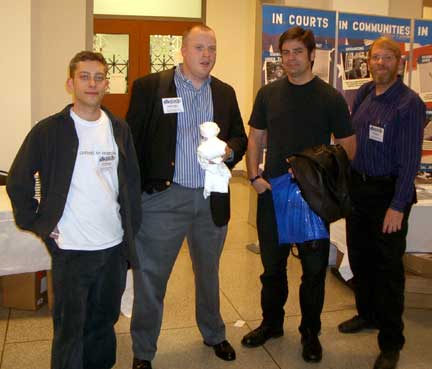The final plenary session of the day.
Eric Sterling, Criminal Justice Policy Foundation
Many reformers have a problem with the word “decriminalization.” However, from his perspective, the definition of decriminalization has potentially undergone some change.
Original: Decriminalization means a minor sanction, users won’t be punished by we’ll still go after the traffickers. That doesn’t make sense.
However, new thought:
Using the word “legalization” puts the burden on the legalizer to define how that will be accomplished.
But new version of “decriminalization” puts burden of proof on the status quo to answer: Why should the state punish drug use? What in the conduct of drug users merits punishment?
Interesting point.
Drug use is a right. It’s hard to imagine anything more intimate than the control of our own neurotransmitters. …
If we want to make a big difference, we need to convince business that drug prohibition hurts their bottom line.
His proposals for ‘after prohibition’:
- Marijuana — growing license similar to getting a hunting license.
- Psychedelics — Psychadelic trip leaders who are insured and licensed professionals
- Other drugs — a Consulting Pharmacist (just like getting advice from a stockbroker) who would advise people on the effects, interactions with other things you might be doing. Might advise you to use a different drug based on what you want to do.
- Treatment on demand. You should be able to get treatment as easily as ordering a pizza.
- Parents and teachers should be able to tell you the truth.
- There will be challenges — we cannot say for certain what the market will look like, so we need to be able to respond and change.
Marsha Rosenbaum, Drug Policy Alliance
The drug prevention industry is impossible to penetrate. It’s a depressing situation. After all the proof, DARE is still out there.
Marsha and DPA has worked on trying to reach parents and get them the real information. That has been successful.
Marsha wrote this letter to her son when he entered High School eight years ago. She reported that two days ago, her son wrote a letter to her about how he took her advice…
It’s a beautiful letter and I hope you’ll get a chance to read it sometime. No way I could type fast enough to get it to you now. I just needed to listen. It’s a powerful letter that vindicates her initial letter to him.
Here’s a couple of pamphlets that you might want to get:
Marsha then showed a video upFront: A Reality-Based Approach to Drug Education about a program at Oakland High School — a fact-based/not fear-based program with real information. What a notion! (Also see UpFrontPrograms.org.)
Nick Gillespie, Reason Magazine
“Drug war screws with everything it touches and it touches everything.”
Why are kids being taken away from math and science to be talked to about drugs at all?
We need to create a post-prohibitionist mindset.
For 50 years, everything in America was geared and oriented to the cold war. From the olympics to chess. America became like the Soviet Union to defeat it.
Today, the prohibitionist mindset infuses everything in our lives Tour de France, baseball, foreign policy, education, … You can’t even take a piss in this country without being told “Just say No to drugs” at the bottom of the urinal.
His approach:
Smarter to regulate all drugs (including prescription drugs) something like beer and alcohol.
We need to move to a post-prohibitionist mindset.
We need to fight the drug war like the allies fought World War II. Everywhere and all the time. We need to be making moral, fiscal and every other argument.
We need to show the cost benefit ratio, including the fact that physical pleasure needs to be added to the calculation.
We have prisons dotting this country like concentration camps in Nazi Germany.
It would be hard to swing a dead bratwurst without hitting some kind of camp. And its true hear now with prisons and drug offenders.
We need to publicize the fact that the drug war is being fought at all times in all corners. And the drug war may be the forever war, because it’s a basic human impulse to alter your consciousness. Drugs are one of the tools of choice in that.
We’ll have to go beyond the cost-benefit ration analysis and move beyond that. Those of us who use drugs have to fundamentally alter the way we talk about drugs. Individuals have more power to remake themselves than ever before in human history.
It’s easier to be gay today than it was in 1940, 1950, 1960, etc. The same thing will be true with being a drug user.
We need to start re-conceiving the idea of drugs — collapse the arbitrary differences — as one tool toward becoming what we want to become. Drugs are like exercise and fashion and surgery….
We will need to stop imbuing inanimate objects with super-human powers.
The end of the war starts in our head.
We must take seriously the credo of the Whole Earth Catalog: “We are as Gods and we might as well get good at it.”
Rachel Kurtz, King County Bar Association
She talked about the wonderful work that KCBA has done. See their reports at King County Bar Association, including Effective Drug Control: Toward a New Legal Framework
We need to come up with even more alternatives to the drug war — She encouraged students to do more research in this area.




